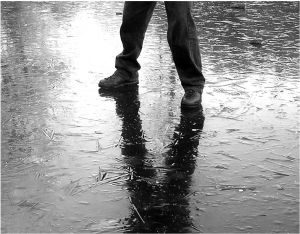Winter in Boston and across the New England is notoriously hazardous – not just for those in cars, but for those on foot as well. Wet snow is trampled into building entryways and sidewalks are slick with ice. While a slip-and-fall injury can certainly happen at any time of the year, it is in the winter when we often see an increase to the presence of ice and snow on the sidewalks and roads of the commonwealth.
 Some of these slip-and-fall cases in Boston can result in serious injury, and, in some cases, it is the fault of an adjacent business owner or company responsible for keeping a parking lot maintained that should be held liable for any damages caused.
Some of these slip-and-fall cases in Boston can result in serious injury, and, in some cases, it is the fault of an adjacent business owner or company responsible for keeping a parking lot maintained that should be held liable for any damages caused.
According to a recent report from The Legal Intelligencer, one jury has just sided with a plaintiff in a slip-and-fall injury case. In that case, the plaintiff slipped and fell on a sidewalk that she alleged was covered in ice and snow. She further alleged the City of Philadelphia was at-fault for not keeping the sidewalk clear and safe to walk on. However, the city filed a cross lawsuit against a third party defendant who owned the property on which the injury occurred.
As our Boston personal injury lawyers can explain, when a person is sued or even countersued in a lawsuit and they feel that another party is the actual responsible party, they can bring that third party into the lawsuit in a process known as impleader. On other the hand, if a third party feels that they should be in the lawsuit so as to protect their rights, they can file what is known as an interpleader joining himself or herself as a third-party plaintiff.
The city was ultimately able to get the case against it dismissed under a local ordinance that put the responsibility on the adjacent property owner to remove any accumulated snow or ice within six hours of it falling. However, the case was then referred to arbitration, where the arbitrator found property owner to be liable in the amount of $50,000 to plaintiff. However, the property owner appealed this arbitration finding, and the case eventually went to a trial before a jury.
This did not turn out to be a good move for the defendant, since the jury found property owner to be 100 percent liable to the plaintiff and entered an award of $108,000 against property owner. This, coupled with the cost of defending the case through trial, put the total verdict as an amount much higher than the original arbitration figure.
The main basis for defending the case was the plaintiff had suffered from a preexisting condition of back problems in addition to the ankle fracture she suffered during the fall. While this can be a valid defense in some cases, there is a longstanding doctrine of tort law that says you “take the plaintiff as you find him,” meaning preexisting conditions are not the plaintiff’s fault in every case. This is also known as the “eggshell skull” doctrine.
If you have suffered personal injury in Massachusetts, call Jeffrey Glassman Injury Lawyers for a free and confidential appointment — (617) 777-7777.
Additional Resources:
Jury Sides With Plaintiff in Snow Slip-and-Fall Case, August 25, 2016, The Legal Intelligencer
More Blog Entries:
Eye Test as Means to Test for Concussion and Brain Injury, July 23, 2016, Boston Brain Injury Lawyer Blog
 Boston Personal Injury Attorney Blog
Boston Personal Injury Attorney Blog

